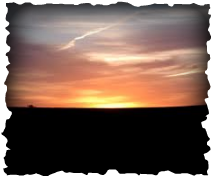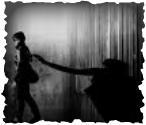Address to the Moon
Nathaniel Hawthorne
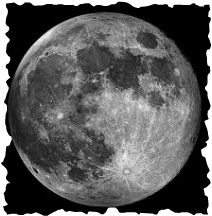
How sweet the silver Moon's pale ray, Falls trembling on the distant bay, O'er which the breezes sigh no more, Nor billows lash the sounding shore. Say, do the eyes of those I love, Behold thee as thou soar'st above, Lonely, majestic and serene, The calm and placid evening's Queen? Say, if upon thy peaceful breast, Departed spirits find their rest, For who would wish a fairer home, Than in that bright, refulgent dome?
Legend of Sleepy Hollow (summary)
Washington Irving
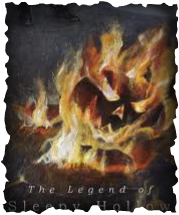
"It's about a guy named Ichabod Crane who is a poor school teacher who works for a mere ten dollars a day. He sleeps in his student's house and only does a little bit of light work around the place. Ichabod falls in love with the beautiful Katrina van Tassel who is a wealthy daughter of a substantial Dutch farmer. One night he is invited to her mansion for a party, he had borrowed a horse from the farmer Hans Van Ripper and was on his way to the party. When he got there, there were a lot of fancy foods such as doughnuts and cakes and all the high people are bragging about their stuff. He got into a discussion with a bunch of people who were all talking about the headless horseman who lurks the night and how they all had encounters with him. One guy Brom Bones, Ichabod's rival, told a story about how he and the horseman were in a race and he was winning until the horseman flew off in a burst of fire. After the party Ichabod was on his way home when, when he was crossing the bridge he saw him, the headless horseman. Ichabod in terror turned his horse around and took off in a hurry. As he was nearing the old church and graveyard he felt some thing hit his head and he fell off. The next morning the farmer horse had returned but there was no sign of Ichabod. They went to search for him but all they found was his hat and a smashed pumpkin.
The Raven
Edgar Allen Poe
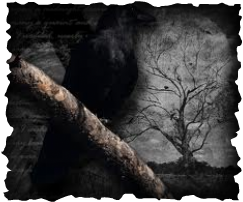
Once upon a midnight dreary, while I pondered, weak and weary, Over many a quaint and curious volume of forgotten lore, While I nodded, nearly napping, suddenly there came a tapping,
As of some one gently rapping, rapping at my chamber door.
"'Tis some visitor," I muttered, "tapping at my chamber door -
Only this, and nothing more."
Ah, distinctly I remember it was in the bleak December,
And each separate dying ember wrought its ghost upon the floor.
Eagerly I wished the morrow; - vainly I had sought to borrow
From my books surcease of sorrow - sorrow for the lost Lenore -
For the rare and radiant maiden whom the angels name Lenore -
Nameless here for evermore.
And the silken sad uncertain rustling of each purple curtain
Thrilled me - filled me with fantastic terrors never felt before;
So that now, to still the beating of my heart, I stood repeating,
"'Tis some visitor entreating entrance at my chamber door -
Some late visitor entreating entrance at my chamber door; -
This it is, and nothing more."
Presently my soul grew stronger; hesitating then no longer,
"Sir," said I, "or Madam, truly your forgiveness I implore;
But the fact is I was napping, and so gently you came rapping,
And so faintly you came tapping, tapping at my chamber door,
That I scarce was sure I heard you"- here I opened wide the door; -
Darkness there, and nothing more.
Deep into that darkness peering, long I stood there wondering, fearing,
Doubting, dreaming dreams no mortals ever dared to dream before;
But the silence was unbroken, and the stillness gave no token,
And the only word there spoken was the whispered word, "Lenore?"
This I whispered, and an echo murmured back the word, "Lenore!" -
Merely this, and nothing more.
Back into the chamber turning, all my soul within me burning,
Soon again I heard a tapping somewhat louder than before.
"Surely," said I, "surely that is something at my window lattice:
Let me see, then, what thereat is, and this mystery explore -
Let my heart be still a moment and this mystery explore; -
'Tis the wind and nothing more."
Open here I flung the shutter, when, with many a flirt and flutter,
In there stepped a stately raven of the saintly days of yore;
Not the least obeisance made he; not a minute stopped or stayed he;
But, with mien of lord or lady, perched above my chamber door -
Perched upon a bust of Pallas just above my chamber door -
Perched, and sat, and nothing more.
Then this ebony bird beguiling my sad fancy into smiling,
By the grave and stern decorum of the countenance it wore.
"Though thy crest be shorn and shaven, thou," I said, "art sure no craven,
Ghastly grim and ancient raven wandering from the Nightly shore -
Tell me what thy lordly name is on the Night's Plutonian shore!"
Quoth the Raven, "Nevermore."
Much I marvelled this ungainly fowl to hear discourse so plainly,
Though its answer little meaning- little relevancy bore;
For we cannot help agreeing that no living human being
Ever yet was blest with seeing bird above his chamber door -
Bird or beast upon the sculptured bust above his chamber door,
With such name as "Nevermore."
But the raven, sitting lonely on the placid bust, spoke only
That one word, as if his soul in that one word he did outpour.
Nothing further then he uttered- not a feather then he fluttered -
Till I scarcely more than muttered, "other friends have flown before -
On the morrow he will leave me, as my hopes have flown before."
Then the bird said, "Nevermore."
Startled at the stillness broken by reply so aptly spoken,
"Doubtless," said I, "what it utters is its only stock and store,
Caught from some unhappy master whom unmerciful Disaster
Followed fast and followed faster till his songs one burden bore -
Till the dirges of his Hope that melancholy burden bore
Of 'Never - nevermore'."
But the Raven still beguiling all my fancy into smiling,
Straight I wheeled a cushioned seat in front of bird, and bust and door;
Then upon the velvet sinking, I betook myself to linking
Fancy unto fancy, thinking what this ominous bird of yore -
What this grim, ungainly, ghastly, gaunt and ominous bird of yore
Meant in croaking "Nevermore."
This I sat engaged in guessing, but no syllable expressing
To the fowl whose fiery eyes now burned into my bosom's core;
This and more I sat divining, with my head at ease reclining
On the cushion's velvet lining that the lamplight gloated o'er,
But whose velvet violet lining with the lamplight gloating o'er,
She shall press, ah, nevermore!
Then methought the air grew denser, perfumed from an unseen censer
Swung by Seraphim whose footfalls tinkled on the tufted floor.
"Wretch," I cried, "thy God hath lent thee - by these angels he hath sent thee
Respite - respite and nepenthe, from thy memories of Lenore:
Quaff, oh quaff this kind nepenthe and forget this lost Lenore!"
Quoth the Raven, "Nevermore."
"Prophet!" said I, "thing of evil! - prophet still, if bird or devil! -
Whether Tempter sent, or whether tempest tossed thee here ashore,
Desolate yet all undaunted, on this desert land enchanted -
On this home by horror haunted- tell me truly, I implore -
Is there - is there balm in Gilead? - tell me - tell me, I implore!"
Quoth the Raven, "Nevermore."
"Prophet!" said I, "thing of evil - prophet still, if bird or devil!
By that Heaven that bends above us - by that God we both adore -
Tell this soul with sorrow laden if, within the distant Aidenn,
It shall clasp a sainted maiden whom the angels name Lenore -
Clasp a rare and radiant maiden whom the angels name Lenore."
Quoth the Raven, "Nevermore."
"Be that word our sign in parting, bird or fiend," I shrieked, upstarting -
"Get thee back into the tempest and the Night's Plutonian shore!
Leave no black plume as a token of that lie thy soul hath spoken!
Leave my loneliness unbroken!- quit the bust above my door!
Take thy beak from out my heart, and take thy form from off my door!"
Quoth the Raven, "Nevermore."
And the Raven, never flitting, still is sitting, still is sitting
On the pallid bust of Pallas just above my chamber door;
And his eyes have all the seeming of a demon's that is dreaming,
And the lamplight o'er him streaming throws his shadow on the floor;
And my soul from out that shadow that lies floating on the floor
Shall be lifted - nevermore!
As of some one gently rapping, rapping at my chamber door.
"'Tis some visitor," I muttered, "tapping at my chamber door -
Only this, and nothing more."
Ah, distinctly I remember it was in the bleak December,
And each separate dying ember wrought its ghost upon the floor.
Eagerly I wished the morrow; - vainly I had sought to borrow
From my books surcease of sorrow - sorrow for the lost Lenore -
For the rare and radiant maiden whom the angels name Lenore -
Nameless here for evermore.
And the silken sad uncertain rustling of each purple curtain
Thrilled me - filled me with fantastic terrors never felt before;
So that now, to still the beating of my heart, I stood repeating,
"'Tis some visitor entreating entrance at my chamber door -
Some late visitor entreating entrance at my chamber door; -
This it is, and nothing more."
Presently my soul grew stronger; hesitating then no longer,
"Sir," said I, "or Madam, truly your forgiveness I implore;
But the fact is I was napping, and so gently you came rapping,
And so faintly you came tapping, tapping at my chamber door,
That I scarce was sure I heard you"- here I opened wide the door; -
Darkness there, and nothing more.
Deep into that darkness peering, long I stood there wondering, fearing,
Doubting, dreaming dreams no mortals ever dared to dream before;
But the silence was unbroken, and the stillness gave no token,
And the only word there spoken was the whispered word, "Lenore?"
This I whispered, and an echo murmured back the word, "Lenore!" -
Merely this, and nothing more.
Back into the chamber turning, all my soul within me burning,
Soon again I heard a tapping somewhat louder than before.
"Surely," said I, "surely that is something at my window lattice:
Let me see, then, what thereat is, and this mystery explore -
Let my heart be still a moment and this mystery explore; -
'Tis the wind and nothing more."
Open here I flung the shutter, when, with many a flirt and flutter,
In there stepped a stately raven of the saintly days of yore;
Not the least obeisance made he; not a minute stopped or stayed he;
But, with mien of lord or lady, perched above my chamber door -
Perched upon a bust of Pallas just above my chamber door -
Perched, and sat, and nothing more.
Then this ebony bird beguiling my sad fancy into smiling,
By the grave and stern decorum of the countenance it wore.
"Though thy crest be shorn and shaven, thou," I said, "art sure no craven,
Ghastly grim and ancient raven wandering from the Nightly shore -
Tell me what thy lordly name is on the Night's Plutonian shore!"
Quoth the Raven, "Nevermore."
Much I marvelled this ungainly fowl to hear discourse so plainly,
Though its answer little meaning- little relevancy bore;
For we cannot help agreeing that no living human being
Ever yet was blest with seeing bird above his chamber door -
Bird or beast upon the sculptured bust above his chamber door,
With such name as "Nevermore."
But the raven, sitting lonely on the placid bust, spoke only
That one word, as if his soul in that one word he did outpour.
Nothing further then he uttered- not a feather then he fluttered -
Till I scarcely more than muttered, "other friends have flown before -
On the morrow he will leave me, as my hopes have flown before."
Then the bird said, "Nevermore."
Startled at the stillness broken by reply so aptly spoken,
"Doubtless," said I, "what it utters is its only stock and store,
Caught from some unhappy master whom unmerciful Disaster
Followed fast and followed faster till his songs one burden bore -
Till the dirges of his Hope that melancholy burden bore
Of 'Never - nevermore'."
But the Raven still beguiling all my fancy into smiling,
Straight I wheeled a cushioned seat in front of bird, and bust and door;
Then upon the velvet sinking, I betook myself to linking
Fancy unto fancy, thinking what this ominous bird of yore -
What this grim, ungainly, ghastly, gaunt and ominous bird of yore
Meant in croaking "Nevermore."
This I sat engaged in guessing, but no syllable expressing
To the fowl whose fiery eyes now burned into my bosom's core;
This and more I sat divining, with my head at ease reclining
On the cushion's velvet lining that the lamplight gloated o'er,
But whose velvet violet lining with the lamplight gloating o'er,
She shall press, ah, nevermore!
Then methought the air grew denser, perfumed from an unseen censer
Swung by Seraphim whose footfalls tinkled on the tufted floor.
"Wretch," I cried, "thy God hath lent thee - by these angels he hath sent thee
Respite - respite and nepenthe, from thy memories of Lenore:
Quaff, oh quaff this kind nepenthe and forget this lost Lenore!"
Quoth the Raven, "Nevermore."
"Prophet!" said I, "thing of evil! - prophet still, if bird or devil! -
Whether Tempter sent, or whether tempest tossed thee here ashore,
Desolate yet all undaunted, on this desert land enchanted -
On this home by horror haunted- tell me truly, I implore -
Is there - is there balm in Gilead? - tell me - tell me, I implore!"
Quoth the Raven, "Nevermore."
"Prophet!" said I, "thing of evil - prophet still, if bird or devil!
By that Heaven that bends above us - by that God we both adore -
Tell this soul with sorrow laden if, within the distant Aidenn,
It shall clasp a sainted maiden whom the angels name Lenore -
Clasp a rare and radiant maiden whom the angels name Lenore."
Quoth the Raven, "Nevermore."
"Be that word our sign in parting, bird or fiend," I shrieked, upstarting -
"Get thee back into the tempest and the Night's Plutonian shore!
Leave no black plume as a token of that lie thy soul hath spoken!
Leave my loneliness unbroken!- quit the bust above my door!
Take thy beak from out my heart, and take thy form from off my door!"
Quoth the Raven, "Nevermore."
And the Raven, never flitting, still is sitting, still is sitting
On the pallid bust of Pallas just above my chamber door;
And his eyes have all the seeming of a demon's that is dreaming,
And the lamplight o'er him streaming throws his shadow on the floor;
And my soul from out that shadow that lies floating on the floor
Shall be lifted - nevermore!
The Murdered Traveller
William Cullen Bryant
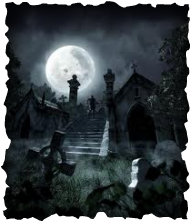
Then spring, to woods and wastes around,
Brought bloom and joy again,
The murdered traveller's bones were found,
Far down a narrow glen.
The fragrant birch, above him, hung
Her tassels in the sky;
And many a vernal blossom sprung,
And nodded careless by.
The red-bird warbled, as he wrought
His hanging nest o'erhead,
And fearless, near the fatal spot,
Her young the partridge led.
But there was weeping far away,
And gentle eyes, for him,
With watching many an anxious day,
Were sorrowful and dim.
They little knew, who loved him so,
The fearful death he met,
When shouting o'er the desert snow,
Unarmed, and hard beset;--
Nor how, when round the frosty pole
The northern dawn was red,
The mountain wolf and wild-cat stole
To banquet on the dead;
Nor how, when strangers found his bones,
They dressed the hasty bier,
And marked his grave with nameless stones,
Unmoistened by a tear.
But long they looked, and feared, and wept,
Within his distant home;
And dreamed, and started as they slept,
For joy that he was come.
So long they looked--but never spied
His welcome step again,
Nor knew the fearful death he died
Far down that narrow glen.
Brought bloom and joy again,
The murdered traveller's bones were found,
Far down a narrow glen.
The fragrant birch, above him, hung
Her tassels in the sky;
And many a vernal blossom sprung,
And nodded careless by.
The red-bird warbled, as he wrought
His hanging nest o'erhead,
And fearless, near the fatal spot,
Her young the partridge led.
But there was weeping far away,
And gentle eyes, for him,
With watching many an anxious day,
Were sorrowful and dim.
They little knew, who loved him so,
The fearful death he met,
When shouting o'er the desert snow,
Unarmed, and hard beset;--
Nor how, when round the frosty pole
The northern dawn was red,
The mountain wolf and wild-cat stole
To banquet on the dead;
Nor how, when strangers found his bones,
They dressed the hasty bier,
And marked his grave with nameless stones,
Unmoistened by a tear.
But long they looked, and feared, and wept,
Within his distant home;
And dreamed, and started as they slept,
For joy that he was come.
So long they looked--but never spied
His welcome step again,
Nor knew the fearful death he died
Far down that narrow glen.
The Cross of Snow
Henry Wadsworth Longfellow
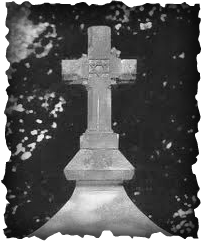
In the long, sleepless watches of the night,
A gentle face -- the face of one long dead --
Looks at me from the wall, where round its head
The night-lamp casts a halo of pale light.
Here in this room she died; and soul more white
Never through martyrdom of fire was led
To its repose; nor can in books be read
The legend of a life more benedight.
There is a mountain in the distant West
That, sun-defying, in its deep ravines
Displays a cross of snow upon its side.
Such is the cross I wear upon my breast
These eighteen years, through all the changingscenes
And seasons, changeless since the day she died.
A gentle face -- the face of one long dead --
Looks at me from the wall, where round its head
The night-lamp casts a halo of pale light.
Here in this room she died; and soul more white
Never through martyrdom of fire was led
To its repose; nor can in books be read
The legend of a life more benedight.
There is a mountain in the distant West
That, sun-defying, in its deep ravines
Displays a cross of snow upon its side.
Such is the cross I wear upon my breast
These eighteen years, through all the changingscenes
And seasons, changeless since the day she died.
Departed Days
Oliver Wendell Holmes
Yes, dear departed, cherished days,
Could Memory's hand restore
Your morning light, your evening rays,
From Times gray urn once more,
Then might this restless heart be still,
This straining eye might close,
And Hope her fainting pinions fold,
While the fair phantoms rose.
But, like a child in ocean's arms,
We strive against the stream,
Each moment farther from the shore
Where life's young fountains gleam;
Each moment fainter wave the fields,
And wider rolls the sea;
The mist grows dark, the sun goes down,
Day breaks, ”And where are we?
Could Memory's hand restore
Your morning light, your evening rays,
From Times gray urn once more,
Then might this restless heart be still,
This straining eye might close,
And Hope her fainting pinions fold,
While the fair phantoms rose.
But, like a child in ocean's arms,
We strive against the stream,
Each moment farther from the shore
Where life's young fountains gleam;
Each moment fainter wave the fields,
And wider rolls the sea;
The mist grows dark, the sun goes down,
Day breaks, ”And where are we?
The Street
James Russell Lowell
They pass me by like shadows, crowds on crowds,
Dim ghosts of men that hover to and fro,
Hugging their bodies round them, like thin shrouds
Wherein their souls were buried long ago:
They trampled on their youth, and faith, and love,
They cast their hope of human-kind away,
With Heaven's clear messages they madly strove,
And conquered,—and their spirits turned to clay.
Lo! how they wander round the world, their grave,
Whose ever-gaping maw by such is fed,
Gibbering at living men, and idly rave,
"We, only, truly live, but ye are dead."
Alas! poor fools, the anointed eye may trace
A dead soul's epitaph in every face!
Dim ghosts of men that hover to and fro,
Hugging their bodies round them, like thin shrouds
Wherein their souls were buried long ago:
They trampled on their youth, and faith, and love,
They cast their hope of human-kind away,
With Heaven's clear messages they madly strove,
And conquered,—and their spirits turned to clay.
Lo! how they wander round the world, their grave,
Whose ever-gaping maw by such is fed,
Gibbering at living men, and idly rave,
"We, only, truly live, but ye are dead."
Alas! poor fools, the anointed eye may trace
A dead soul's epitaph in every face!
At Eventide
John Greenleaf Whittier
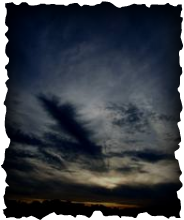
Poor and inadequate the shadow-play
Of gain and loss, of waking and of dream,
Against life's solemn background needs must seem
At this late hour. Yet, not unthankfully,
I call to mind the fountains by the way,
The breath of flowers, the bird-song on the spray,
Dear friends, sweet human loves, the joy of giving
And of receiving, the great boon of living
In grand historic years when Liberty
Had need of word and work, quick sympathies
For all who fail and suffer, song's relief,
Nature's uncloying loveliness; and chief,
The kind restraining hand of Providence,
The inward witness, the assuring sense
Of an Eternal Good which overlies
The sorrow of the world, Love which outlives
All sin and wrong, Compassion which forgives
To the uttermost, and Justice whose clear eyes
Through lapse and failure look to the intent,
And judge our frailty by the life we meant.
Of gain and loss, of waking and of dream,
Against life's solemn background needs must seem
At this late hour. Yet, not unthankfully,
I call to mind the fountains by the way,
The breath of flowers, the bird-song on the spray,
Dear friends, sweet human loves, the joy of giving
And of receiving, the great boon of living
In grand historic years when Liberty
Had need of word and work, quick sympathies
For all who fail and suffer, song's relief,
Nature's uncloying loveliness; and chief,
The kind restraining hand of Providence,
The inward witness, the assuring sense
Of an Eternal Good which overlies
The sorrow of the world, Love which outlives
All sin and wrong, Compassion which forgives
To the uttermost, and Justice whose clear eyes
Through lapse and failure look to the intent,
And judge our frailty by the life we meant.
